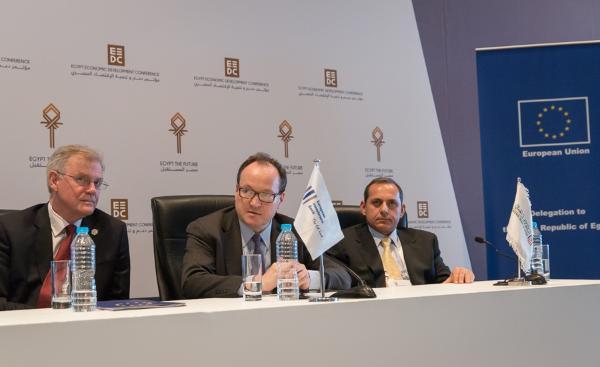
At a very important time, when the Egypt Economic Development Conference was taking place in Sharm El-Sheikh, the European Investment Bank (EIB) signed a €120 million loan with the National Bank of Egypt (NBE) for financing private sector companies. As part of the Private Sector Growth and Economic Development project, the loan is focused on small and medium-sized enterprises (SMEs), implementing projects in the productive and services sectors.
With this credit line the EIB has decided to support Egypt in a very concrete way in its efforts to boost the development of the private sector and thus promote the productivity and competitiveness of the Egyptian economy while balancing the needs for increased job creation in Egypt.
This line of credit – which concerns private sector companies throughout the country – will develop the NBE’s ability to reach out to SMEs in Egypt and thus improve their access to credit in the form of longer-term loans than those currently available, denominated in EUR and USD, to support import and export transactions.
“It is a real pleasure to sign such a contract for supporting SMEs during my first visit to Egypt on behalf of the European Investment Bank. Through this financing and as a key financing partner of Egypt, EIB’s objective is to support the social and economic transition by promoting SMEs, development and competitiveness. With this support, we will encourage job creation, especially for the younger generation”, said EIB Vice-President Ambroise Fayolle during the signing ceremony.
This EIB financing operation is in line with the European Union’s and Egypt’s national priority to promote the development of a market economy, which will encourage investment and trade at a national and international level.
EIB signed also in Sharm El Sheikh a joint declaration with the Government of the Arab Republic of Egypt to reinforce and strengthen the cooperation on social and economic development in Egypt. To position Egypt as an attractive destination on the global investment map, the partnership will be focused on the following two pillars of activity:
- improving socioeconomic infrastructure in the sectors of energy, transport, water, wastewater and waste disposal, urban development, public-private partnerships, and information and communication technologies ;
- supporting the development of the private sector in the fields of industry, foreign direct investment and micro, small and medium-sized enterprises.
In line with these priorities, the EIB has been quick off the mark and already identified a pipeline of projects that the Bank can support with financing in excess of €2bn, including further projects in the fields of energy, transport, water, banking and industry. The Bank is committed to providing adequate guarantee provisions and favourable operational conditions.
The EIB, a key financial partner for Egypt
Since it began operations in Egypt in 1979, the EIB has financed more than 90 projects, in both the public and private sectors, for an amount of €6.3 billion in loans and private equity, leveraging a total investment value of over €20 billion.
Over the course of the External Lending Mandate for 2007-2013, the EIB signed loan facilities in Egypt amounting to €1.9 billion and – despite the prolonged political transition – €1 billion since 2011. In terms of sector allocation, energy was by far the main focus of operations, receiving €1 billion of finance. Other areas of investment included industry (€346 million), water and wastewater (€127 million), urban infrastructure development (€45 million) and credit lines to SMEs (€83 million). The Bank also provided €27.5 million to SMEs through private equity participations involving third party resources, thereby confirming its major role in this country as the leading international financier in the Mediterranean region.
Looking ahead to 2015-2017, the EIB has an identified pipeline of projects of well in excess of €2bn, with a focus on investments aligned with the priorities of the Egyptian Government in the areas of transport, energy, lending to SMEs and support for the private sector.

Photographer: EIB ©To be defined
Download original

Photographer: EIB ©To be defined
Download original

Photographer: EIB ©To be defined
Download original

Photographer: EIB ©To be defined
Download original